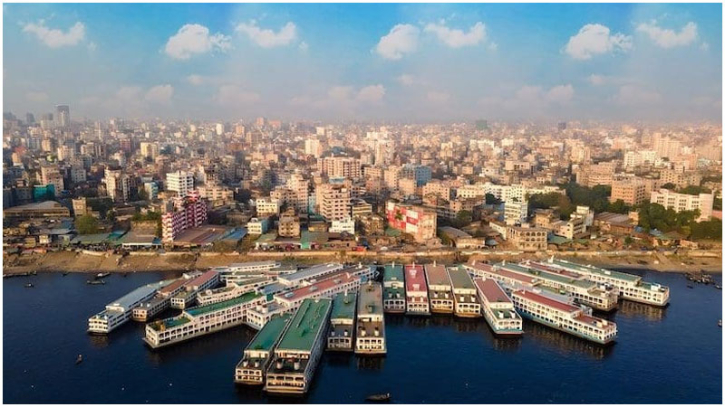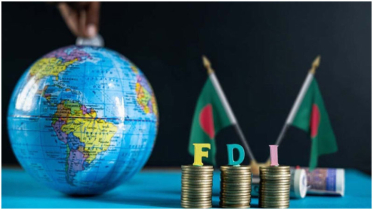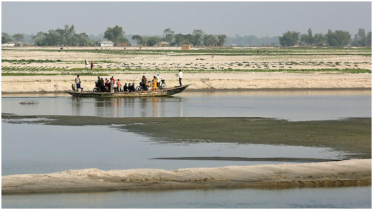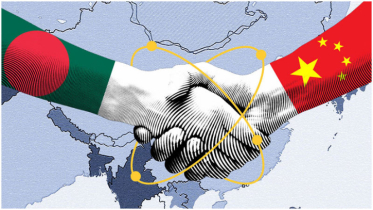Assessing Trump's tariff: Bangladesh must rethink its political trade dependence

Bangladesh found a breathing space after U.S. President Donald Trump had granted a 90-day exemption from the recently imposed 37% tariff on Bangladeshi exports to the United States, as part of a broader initiative temporarily easing trade restriction for multiple countries. This brings to the fore a longstanding challenge that Bangladesh can no longer afford to sideline—political trade dependence.
Although markets in different nations have seen disruption due to this decision by the Trump administration’s trade policy, Bangladesh’s vulnerability has been laid bare. While this offers Bangladesh some breathing space, it also urges the country to swiftly reduce its trade deficit with the USA as a temporary measure. Ultimately, Bangladesh must act quickly to diversify its exports and minimize its exposure to unpredictable external trade pressures.
A Delicate Balancing
The Trump-imposed 37% tariff came as a sudden shock to Bangladeshi exporters, particularly those in the ready-made garment (RMG) sector, as over 90% of its foreign exchange earnings come from the USA. The garment industry employs nearly four million people, making it not just an economic pillar but also a social backbone. Such a steep tariff, if imposed instantly could have disruptive consequences for employment, foreign currency reserves, and economic stability for Bangladesh. All of this pertains to Bangladesh’s political trade dependence—a condition that arises when a nation relies extensively on another, often more powerful, country for essential trade, rendering the relationship susceptible to political maneuvering or diplomatic tensions.
Professor Yunus’s letter tactfully addresses this crisis by aligning Bangladesh with the U.S. trade agenda and offering a multi-pronged strategy to support American economic interests. Key points from the letter include:
- Commitment to increase imports of U.S. agricultural products like cotton, wheat, corn, and soybean.
- Establishment of a duty-free bonded warehouse for U.S. cotton in Bangladesh.
- Implementation of a zero-tariff policy on U.S. scrap metals and agricultural imports.
- Progressive reduction of tariffs on key U.S. export items, including gas turbines, semiconductors, and medical equipment.
- Removal of non-tariff barriers, such as complex testing and packaging requirements.
- Acceleration of U.S. tech sector entry, particularly with the launch of Starlink in Bangladesh.
This strategic roadmap is designed not only to appease Washington but also to recalibrate the deeply skewed trade dynamics between the two nations.
Trade Deficit: Is the Price of Engagement with the U.S. Worth It?
At the core of the U.S. grievance lays the trade deficit with Bangladesh. As of the data of 2024, Bangladesh exports over $8.4 billion worth of goods to the U.S., while importing around $2.2 billion in return. This lopsided trade balance is vulnerable in the peak of protectionist policies, particularly under a U.S. administration that views trade imbalances as direct threats to national interests.
During the 90-day moratorium, Bangladesh has committed to aggressively reducing the trade deficit by increasing imports from the U.S., with the goal of bringing down the existing 70–74% tariff on U.S. goods to 45–50%—a move that will not only strengthen bilateral ties but also encourage reciprocal gestures from Washington, So that the 37% tariff on Bangladeshi goods will be reduced to approximately 15-25%.
However, this transition will come at a cost. Reducing tariffs on imports means potential revenue losses for the government and increased competition for domestic producers. The challenges ahead remain in balancing these domestic economic interests with international diplomatic priorities. Yet, Bangladesh must prioritize trade, taking into account its political trade dependence. As an exporting country, Bangladesh is heavily dependent on changes in U.S. policy. In long-term trade relations, Bangladesh must address the subject that policy changes in certain countries should not make it vulnerable. The issue of political trade dependence (PTD) can, in theory, be addressed through diversification and the pursuit of strategic trade agreements with relevant countries, where necessary. However, in the absence of such diversification, PTD ultimately becomes a mechanism through which trade relations may be weaponized. In the context of trade with the United States, Bangladesh must intensify its diplomatic efforts to revive and capitalize on the TICFA framework.
The Need for Export Diversification
Bangladesh’s overreliance on the RMG sector is no longer just an economic limitation—it’s a political liability. The U.S. tariff shock has highlighted the urgent need for export diversification, not only to mitigate future trade risks but to also climb higher in the global value chain.
To this end, Bangladesh has identified several promising sectors for development:
1. ICT and Semiconductor Industry:
With a young, tech-savvy population and a rapidly expanding digital infrastructure, Bangladesh is poised to become a regional ICT hub. Semiconductor industry, global outsourcing and software development offer lucrative opportunities for Bangladesh to expand beyond traditional goods-based exports.
2. Service Economy:
The global shift toward service-driven economies opens new frontiers for Bangladesh. From customer support and virtual assistance to educational services and design consultancy, exporting services offers high margins with relatively low resource input.
3. Low-Technology, Labor-Intensive Products:
While high-tech industries are a long-term goal, short-term diversification can benefit from focusing on low-tech, labor-intensive products such as leather goods, handicrafts, ceramics, and light engineering tools. These sectors can absorb a large workforce and reduce pressure on the RMG industry.
4. Brand and Marketing Support:
Bangladeshi manufacturers often work as subcontractors for global brands. The next step is to develop homegrown brands that carry Bangladeshi identity to global markets. Investing in branding, designing, and digital marketing of entrepreneurs can increase the per-unit value of exports significantly.
Trade Reforms amid Structural Challenges
Professor Yunus’s letter makes clear promises about eliminating non-tariff barriers and simplifying customs regulations to facilitate U.S. exports. These reforms, if implemented, can help Bangladesh align better with US policies. Such measures will not only satisfy U.S. concerns but also improve the overall efficiency of Bangladesh’s trade ecosystem. Transforming Bangladesh’s trade architecture is not a matter of diplomacy alone—it demands deep structural reforms. These include:
- Strengthening export credit and insurance systems to support new ventures.
- Investing in education and skill development, especially in ICT and services.
- Upgrading ports and logistics to match international throughput standards.
- Formulating a national trade diversification strategy with measurable targets.
Besides, the inclusion of Starlink, Elon Musk’s satellite internet service, should be marked as a symbolic shift in Bangladesh’s trade relationship. It should represent a move from basic commodity trade to a strategic tech alliance. Alongside this, Bangladesh’s openness to collaborations in civil aviation and defense sectors further signals a pivot toward long-term, high-value partnerships. If managed correctly, these developments can open new revenue streams, reduce trade vulnerability, and align Bangladesh with cutting-edge global trends.
Conclusion: Turning Crisis into Opportunity
Bangladesh’s dependence on a few sectors and a few markets has placed it in a precarious position in an increasingly uncertain global trade environment. The recent unprecedented tariff levy from the United States is a wake-up call—but also an opportunity. With political clarity, institutional resolve, and strategic foresight, Bangladesh can transform this crisis into a springboard for a more resilient, diversified, and future-ready economy.
Writer: Md. Abu Saim, former student of International Relations at Dhaka University. Md. Abu Saim also completed his MSS in International Political Economy. At present, he is a development worker in migration sector, working for WARBE Development Foundation.
Source: Eurasia Review
.png)




